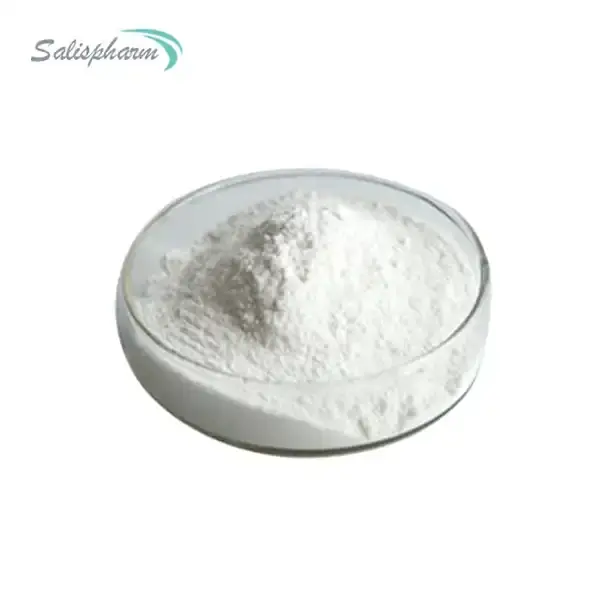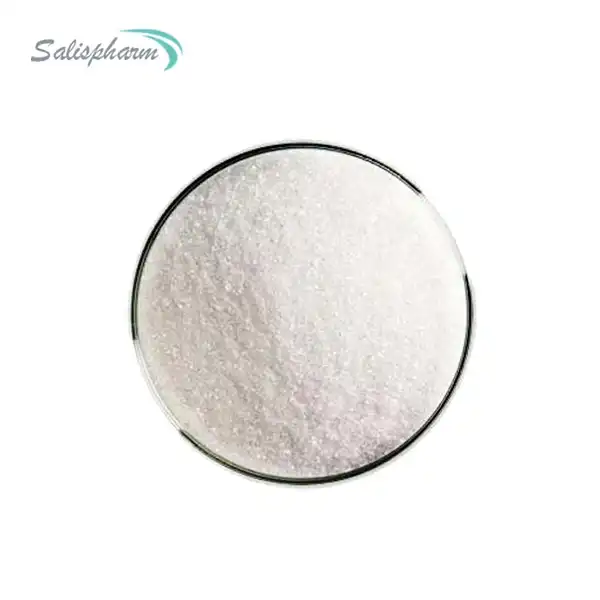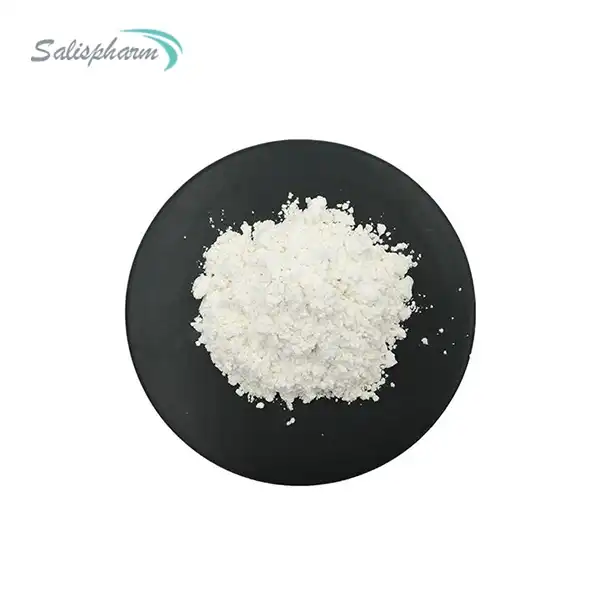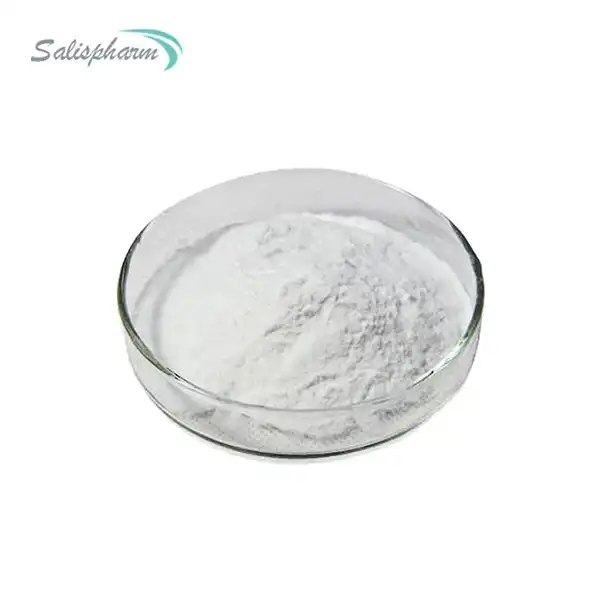Dicyclomine is a medication primarily used to treat symptoms associated with irritable bowel syndrome (IBS) and other gastrointestinal disorders. As an anticholinergic and antispasmodic agent, dicyclomine works by relaxing the smooth muscles in the digestive tract, effectively reducing painful spasms and cramps. This blog post will explore the various symptoms that dicyclomine can help alleviate, its mechanism of action, and important considerations for its use.
How does Dicyclomine Powder work in the body?
Dicyclomine powder, also known by its brand name Bentyl, is an anticholinergic medication that works by blocking the action of acetylcholine, a neurotransmitter responsible for stimulating muscle contractions in the digestive system. By inhibiting acetylcholine's effects, dicyclomine helps to relax the smooth muscles in the gastrointestinal tract, reducing spasms and associated pain.
The medication's mechanism of action involves binding to muscarinic receptors, which are found throughout the body but are particularly abundant in the digestive system. When dicyclomine blocks these receptors, it prevents acetylcholine from binding and triggering muscle contractions. This action results in a decrease in gut motility and a reduction in the frequency and intensity of painful spasms.
Dicyclomine's effects are not limited to the digestive system, as it can also impact other areas of the body where acetylcholine plays a role. This broader impact contributes to both its therapeutic effects and potential side effects. For instance, the medication may also help reduce excessive secretions in the digestive tract, which can be beneficial for certain gastrointestinal conditions.
The onset of action for dicyclomine is relatively quick, with many patients experiencing relief within 30-60 minutes after taking the medication. However, it may take several days of consistent use to achieve maximum therapeutic benefit. This gradual buildup of effect is why healthcare providers often recommend taking dicyclomine regularly as prescribed, rather than only when symptoms occur.
It's important to note that while dicyclomine powder is effective in managing symptoms, it does not address the underlying causes of conditions like IBS. Instead, it provides symptomatic relief, allowing patients to better manage their condition and improve their quality of life. For this reason, dicyclomine is often used as part of a comprehensive treatment plan that may include dietary modifications, stress management techniques, and other therapeutic approaches.
What are the primary uses of Dicyclomine Powder in treating gastrointestinal disorders?
Dicyclomine powder is primarily used in the treatment of various gastrointestinal disorders, with its main indication being the management of irritable bowel syndrome (IBS). However, its antispasmodic properties make it useful for several other conditions affecting the digestive system.
1. Irritable Bowel Syndrome (IBS):
IBS is the most common condition for which dicyclomine is prescribed. This functional gastrointestinal disorder is characterized by chronic abdominal pain, bloating, and altered bowel habits. Dicyclomine is particularly effective in managing the pain and discomfort associated with IBS-D (diarrhea-predominant) and IBS-M (mixed type) by reducing intestinal spasms and normalizing bowel movements.
2. Functional Dyspepsia:
Also known as indigestion, functional dyspepsia can cause symptoms such as upper abdominal pain, bloating, and early satiety. Dicyclomine can help alleviate these symptoms by relaxing the smooth muscles of the stomach and upper intestines, reducing discomfort and improving digestion.
3. Gastrointestinal Spasms:
Dicyclomine is effective in treating various types of gastrointestinal spasms, including those associated with conditions like gastroenteritis, diverticulitis, and inflammatory bowel diseases (in conjunction with other treatments).
4. Biliary Colic:
This condition, characterized by severe pain caused by gallstones, can sometimes be managed with dicyclomine. The medication helps to relax the smooth muscles of the biliary tract, potentially providing relief from pain and spasms.
5. Dysmenorrhea:
While not a gastrointestinal disorder, dicyclomine can be used off-label to treat painful menstrual cramps. Its antispasmodic effects can help relax the uterine muscles, reducing pain and discomfort associated with menstruation.
6. Chronic Intestinal Pseudo-obstruction:
This rare condition, characterized by impaired intestinal motility, can sometimes be managed with dicyclomine to help reduce symptoms of bloating, pain, and nausea.
7. Gastroparesis:
In some cases, dicyclomine may be used as part of the treatment regimen for gastroparesis, a condition where the stomach takes too long to empty its contents. By relaxing the stomach muscles, dicyclomine can help alleviate symptoms such as nausea and vomiting.
It's crucial to note that while dicyclomine is effective in managing symptoms, it should be used under the guidance of a healthcare professional. The dosage and duration of treatment can vary depending on the specific condition being treated and the individual patient's response to the medication.
Moreover, dicyclomine is not suitable for everyone. It should be used with caution in elderly patients, those with certain pre-existing medical conditions, and is contraindicated in some situations, such as in patients with glaucoma or myasthenia gravis. Always consult with a healthcare provider to determine if dicyclomine is an appropriate treatment option for your specific condition.
Can Dicyclomine Powder cause any side effects, and how can they be managed?
While dicyclomine powder is generally well-tolerated and effective in managing various gastrointestinal symptoms, like all medications, it can potentially cause side effects. It's important for patients and healthcare providers to be aware of these possible effects and know how to manage them effectively.
Common side effects:
1. Dry mouth: This is one of the most frequently reported side effects of dicyclomine. Patients can manage this by staying hydrated, chewing sugar-free gum, or using saliva substitutes.
2. Blurred vision: This effect is usually temporary and resolves as the body adjusts to the medication. If persistent, patients should consult their healthcare provider.
3. Constipation: Increasing fiber intake, staying hydrated, and regular exercise can help alleviate this side effect.
4. Urinary retention: This is more common in older adults or those with prostate problems. If this occurs, medical attention should be sought.
5. Dizziness or lightheadedness: This can be managed by rising slowly from a sitting or lying position and avoiding sudden movements.
6. Drowsiness: Patients should avoid driving or operating machinery if they experience this effect, especially when first starting the medication.
7. Headache: Over-the-counter pain relievers can usually manage this symptom, but persistent headaches should be reported to a healthcare provider.
Less common side effects:
1. Confusion or disorientation: This is more likely to occur in elderly patients. If this occurs, medical attention should be sought immediately.
2. Rapid heartbeat: While uncommon, if this occurs, patients should contact their healthcare provider.
3. Skin rash or allergic reactions: These should be reported to a healthcare provider immediately.
4. Heat intolerance: Dicyclomine can reduce sweating, potentially leading to heat exhaustion. Patients should be cautious in hot environments and stay hydrated.
Managing side effects:
1. Dosage adjustment: Often, side effects can be managed by adjusting the dosage. This should always be done under the guidance of a healthcare provider.
2. Timing of doses: Taking dicyclomine powder with food can help reduce gastrointestinal side effects.
3. Gradual introduction: Starting with a lower dose and gradually increasing it can help the body adjust and potentially reduce side effects.
4. Monitoring: Regular check-ups with a healthcare provider can help identify and manage any side effects early.
5. Alternative formulations: If the powder form causes issues, other formulations like tablets or liquid may be better tolerated.
6. Lifestyle modifications: Adequate hydration, balanced diet, and regular exercise can help mitigate some side effects.
7. Complementary treatments: For some side effects, like dry mouth, complementary treatments or products may be recommended by a healthcare provider.
It's crucial to note that while this discussion of side effects is comprehensive, it should not cause undue alarm. Many patients take dicyclomine without experiencing significant side effects, and the benefits often outweigh the risks for those with chronic gastrointestinal symptoms.
Patients should always communicate openly with their healthcare providers about any side effects they experience. In some cases, the benefits of symptom relief may outweigh mild side effects, while in others, alternative treatments may need to be considered.
Remember, never stop taking dicyclomine abruptly without consulting a healthcare provider, as this can lead to a return of symptoms. Any changes in medication regimen should be done under medical supervision.
By being informed about potential side effects and how to manage them, patients can work collaboratively with their healthcare providers to optimize their treatment with dicyclomine powder, ensuring the best possible outcomes in managing their gastrointestinal symptoms.
If you are also interested in this product and want to know more product details, or want to know about other related products, please feel free to contact iceyqiang@aliyun.com.
References:
1. Ranga, V., et al. (2023). Dicyclomine. In StatPearls. StatPearls Publishing.
2. Ford, A. C., et al. (2020). American College of Gastroenterology Monograph on Management of Irritable Bowel Syndrome. American Journal of Gastroenterology, 115(Suppl 1), S1-S17.
3. Lacy, B. E., et al. (2021). ACG Clinical Guideline: Management of Irritable Bowel Syndrome. American Journal of Gastroenterology, 116(1), 17-44.
4. Rao, S. S. C., et al. (2020). Functional Gastrointestinal Disorders: Advances in Understanding and Management. Gastroenterology, 158(2), 319-332.
5. Camilleri, M. (2021). Diagnosis and Treatment of Irritable Bowel Syndrome: A Review. JAMA, 325(9), 865-877.
6. Enck, P., et al. (2016). Irritable bowel syndrome. Nature Reviews Disease Primers, 2, 16014.
7. Chey, W. D., et al. (2015). Irritable Bowel Syndrome: A Clinical Review. JAMA, 313(9), 949-958.
8. Mearin, F., et al. (2016). Bowel Disorders. Gastroenterology, 150(6), 1393-1407.e5.
9. Talley, N. J., & Ford, A. C. (2015). Functional Dyspepsia. New England Journal of Medicine, 373(19), 1853-1863.
10. Moayyedi, P., et al. (2017). ACG and CAG Clinical Guideline: Management of Dyspepsia. American Journal of Gastroenterology, 112(7), 988-1013.









